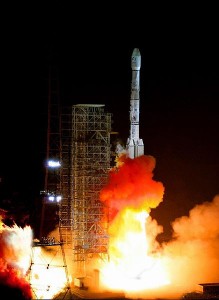China perfecting satellite navigation system


"It has laid an extremely important foundation for setting up and perfecting the Compass Navigation Satellite System," said the chief designer and engineer of the project, Sun Jiadong. "The ‘one-rocket, two-satellite' launch will help the system realize global coverage soon."
By the year end, the country will put another three satellites into space, making it 16 in total and covering the whole Asia-Pacific area. By 2020, over 30 satellites will orbit the earth and provide navigating and positioning service with an error margin of less than 10 meters (33ft). It would let China join the US (GPS) and Russia (GLONASS) in becoming the third country in the world that owns an independent satellite navigating and positioning system.
The launch also rattled the nerves of China's neighbors. The Jiji news agency in Japan and the Indian newspaper, The Hindu, both pointed out that the launch was a symbol of China's growing military might and a possible threat to other countries in the area, because the satellites can also be used to guide missiles and set up national missile defense systems.
But Ran Chengqi, Director of the China Navigation Satellite Office, sees it differently. "According to a less ambitious projection, the satellite navigating industry will have a market value of over 400 billion yuan (63.4bn USD) by 2020," said Ran during an annual industry conference in Shanghai last month.
Since the test operation in December 2011, the Compass Navigation Satellite System has been providing free services to over 100,000 devices, according to China.com.cn's report.